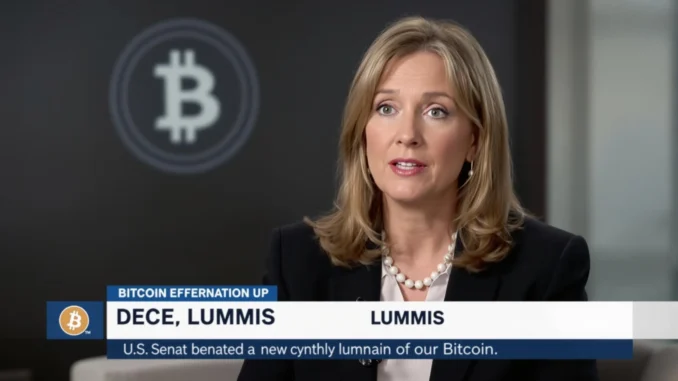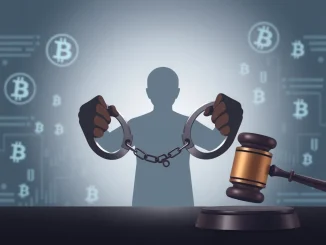
In a world of ever-shifting financial landscapes, where should your hard-earned money reside? U.S. Senator Cynthia Lummis has a clear answer, and it’s causing ripples across the financial world. Speaking with Fox Business, the staunch pro-crypto advocate didn’t mince words, declaring, “I spend dollars and save Bitcoin.” But what’s behind this seemingly simple yet powerful statement? Let’s dive into the Senator’s perspective and unpack why this could be more than just a personal financial strategy; it might be a sign of the times for those considering cryptocurrency and the future of finance.
Why is Cynthia Lummis Choosing to Save Bitcoin?
Senator Lummis’s rationale is rooted in a fundamental economic principle: the long-term value proposition of Bitcoin versus the perceived decline in the purchasing power of the U.S. dollar. She points to two key factors:
- Bitcoin’s Scarcity and Growth Potential: Unlike traditional fiat currencies, Bitcoin has a capped supply of 21 million coins. This scarcity is a cornerstone of its value proposition. As demand grows or remains constant and supply is limited, basic economics suggests the price should increase over time. Lummis emphasizes this long-term growth potential, viewing Bitcoin as an asset that appreciates despite short-term volatility.
- Dollar Debasement Concerns: The Senator highlights the ongoing issue of dollar debasement. This refers to the reduction in the value of a currency, often due to increased money supply through actions like quantitative easing. Many argue that government policies designed to stimulate the economy can inadvertently lead to inflation, eroding the purchasing power of the dollar over time. Lummis, and others sharing her viewpoint, see Bitcoin as a hedge against this potential debasement.
In essence, Lummis is positioning Bitcoin as a superior store of value compared to the U.S. dollar, especially for long-term savings. She’s essentially saying that holding Bitcoin is a way to preserve and potentially grow wealth in an era where traditional currencies might be losing their purchasing power.
Decoding Dollar Debasement: Is Your Money Losing Value?
The term “dollar debasement” might sound complex, but the concept is quite straightforward. Think of it like this: if you have a fixed-size pie (the total value of goods and services in an economy) and you print more money (more slices of pie), each slice becomes smaller. Your dollar buys less than it used to.
Several factors contribute to dollar debasement, including:
- Increased Money Supply: When central banks inject more money into the economy, it can lead to inflation, diluting the value of each existing dollar.
- Government Debt: High levels of government debt can also contribute to concerns about currency devaluation as governments might resort to inflationary measures to manage debt.
- Inflation: Rising prices for goods and services are a direct symptom of currency debasement. If your wages don’t keep pace with inflation, your real purchasing power decreases.
While moderate inflation is often considered healthy for an economy, excessive or uncontrolled inflation can erode savings and negatively impact financial stability. Senator Lummis’s statement reflects a growing concern among some that current economic policies may be contributing to a long-term trend of dollar debasement.
Cynthia Lummis: A Bitcoin Champion in the Senate
Senator Cynthia Lummis is not just another politician casually mentioning Bitcoin. She is arguably the most vocal and prominent advocate for cryptocurrency in the U.S. Senate. Her background and actions solidify her position as a true believer in the potential of digital assets:
- Deep Understanding of Bitcoin: Lummis has demonstrated a strong understanding of Bitcoin’s technology, economics, and potential use cases. She’s not just parroting talking points; she speaks with knowledge and conviction.
- Legislative Efforts for Crypto: Beyond words, Lummis is actively working on legislation to create a clearer and more favorable regulatory environment for cryptocurrencies in the United States. This includes efforts to define digital assets legally, address taxation, and foster innovation within the crypto space.
- Personal Bitcoin Holdings: Lummis has publicly disclosed owning Bitcoin, further demonstrating her commitment and belief in the asset. Her personal investment aligns with her public advocacy, lending credibility to her statements.
- Education and Advocacy: She consistently uses her platform to educate her colleagues and the public about the benefits of Bitcoin and blockchain technology, pushing for greater understanding and acceptance.
Senator Lummis’s consistent and informed advocacy makes her voice particularly influential in the ongoing conversation about the future of finance and the role of cryptocurrency.
Is Saving Bitcoin a Smart Strategy for You?
Senator Lummis’s approach raises a critical question: Should you also be adopting a “save Bitcoin” strategy? While her perspective is compelling, it’s crucial to consider your own financial situation and risk tolerance. Here’s a balanced view:
Potential Benefits of Saving Bitcoin:
- Inflation Hedge: As discussed, Bitcoin’s scarcity can make it a potential hedge against inflation and dollar debasement.
- Diversification: Adding Bitcoin to your portfolio can diversify your holdings beyond traditional assets like stocks and bonds, potentially reducing overall portfolio risk.
- Long-Term Growth Potential: Many believe Bitcoin has significant long-term growth potential as adoption increases and the technology matures.
- Decentralization and Financial Sovereignty: Bitcoin offers a decentralized alternative to traditional financial systems, giving individuals more control over their assets.
Important Considerations Before Saving Bitcoin:
- Volatility: Bitcoin is known for its price volatility. Significant price swings are common, and you should be prepared for potential losses in the short term.
- Risk Assessment: Understand the risks associated with cryptocurrency investments. Only invest what you can afford to lose.
- Security and Custody: Properly securing your Bitcoin is crucial. Learn about different wallet options and best practices for safeguarding your digital assets.
- Regulatory Uncertainty: The regulatory landscape for cryptocurrency is still evolving. Changes in regulations could impact the value and usability of Bitcoin.
Actionable Insights:
- Do Your Research: Before investing in Bitcoin, thoroughly research the technology, its risks, and potential rewards.
- Start Small: If you’re new to Bitcoin, consider starting with a small investment to gain experience and understanding.
- Long-Term Perspective: Adopt a long-term investment horizon when considering Bitcoin. Short-term price fluctuations are normal.
- Seek Financial Advice: Consult with a qualified financial advisor to determine if Bitcoin aligns with your overall financial goals and risk profile.
Conclusion: A Bold Stance on the Future of Money
Senator Cynthia Lummis‘s statement, “I spend dollars and save Bitcoin,” is more than just a soundbite. It’s a reflection of a growing sentiment that traditional financial systems are facing challenges, and alternative assets like Bitcoin are gaining traction as potential solutions. While saving Bitcoin might not be suitable for everyone, understanding the rationale behind this strategy – concerns about dollar debasement and the long-term potential of cryptocurrency – is crucial in today’s evolving financial world. Whether you choose to embrace Bitcoin or not, the conversation sparked by figures like Senator Lummis is undeniably shaping the future of money and investment.



